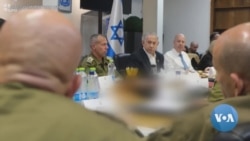ໃນຂະນະທີ່ປະເທດ ອິສຣາແອລ ທີ່ມີຄວາມແຕກແຍກກັນຢ່າງເລິກເຊິ່ງສະເຫຼີມສະຫຼອງວັນຄົບຮອບ 75 ປີນັ້ນ, ບັນດານັກວິເຄາະກ່າວວ່າ ອີຣ່ານ ແມ່ນກຳລັງມີຄວາມແຂງແກ່ນຂຶ້ນໃນພາກພື້ນຕາເວັນອອກກາງ ແລະ ອາດເປັນໄພຂົ່ມຂູ່ຕໍ່ ອິສຣາແອລ ໃນຫຼາຍດ້ານ. ນັກຂ່າວວີໂອເອ ລິນດາ ແກຣດສໄຕນ໌ ມີລາຍງານຈາກນະຄອນ ເຈຣູຊາແລັມ, ເຊິ່ງ ພຸດທະສອນ ຈະນຳລາຍລະອຽດມາສະເໜີທ່ານໃນອັນດັບຕໍ່ໄປ.
ອິສຣາແອລ ແມ່ນໄດ້ຮັບຄວາມເສຍຫາຍຈາກຄວາມແຕກແຍກພາຍໃນປະເທດ ແລະ ການປະທ້ວງຂະໜາດໃຫຍ່ ກ່ຽວກັບ ການປັບປຸງລະບົບຕຸລາການໃໝ່ທີ່ລັດຖະບານຂອງນາຍົກລັດຖະມົນຕີ ທ່ານ ເບັນຈາມິນ ເນຕັນຢາຮູ ຕ້ອງການ. ບັນດານັກວິເຄາະກ່າວວ່າ ອີຣ່ານ ແລະ ກອງກຳລັງຕົວແທນໃນພາກພື້ນຂອງພວກເຂົາພິຈາລະນາຄວາມວຸ້ນວາຍພາຍໃນປະເທດຂອງ ອິສຣາແອລ ວ່າເປັນສັນຍານຂອງຄວາມອ່ອນແອ.
ທ່ານ ຢາກອຟ ອາມິດຣໍ, ອະດີດທີ່ປຶກສາດ້ານຄວາມປອດໄພແຫ່ງຊາດ ອິສຣາແອລ ໄດ້ກ່າວວ່າ “ຜູ້ປະທ້ວງ ແລະ ຫຼາຍກວ່າການປະທ້ວງນັ້ນ ມັນແມ່ນໄພຂົ່ມຂູ່ທີ່ເຈົ້າໜ້າທີ່ກອງໜູນ ແລະ ຄົນຂັບເຮືອບິນຈຳນວນນຶ່ງບໍ່ໄດ້ອອກມາເວລາທີ່ເຂົາເຈົ້າຖືກຮຽກຕົວ, ເຮັດໃຫ້ຝ່າຍອື່ນມີຄວາມຮູ້ສຶກວ່າ ອິສຣາແອລ ແມ່ນກຳລັງພັງລົງ.”
ຫຼັງຈາກການປະທະກັນລະຫວ່າງທະຫານ ອິສຣາແອລ ກັບຜູ້ນິຍົມນັບຖືຊາວ ປາແລັສໄຕນ໌ຢູ່ວັດອິສລາມ ອາລ-ອັກຊາ ຂອງນະຄອນ ເຈຣູຊາແລັມ ໃນລະຫວ່າງບຸນອົດອາຫານ ຣາມາດານ ນັ້ນ, ຈະຫຼວດຫຼາຍສິບລູກແມ່ນຖືກຍິງເຂົ້າໃສ່ ອິສຣາແອລ.
ບັນດາເຈົ້າໜ້າທີ່ກ່າວວ່າ ຈະຫຼວດທີ່ຖືກຍິງຈາກທັງ ເລບານອນ ໃນພາກເໜືອ ແລະ ເຂດ ກາຊາ ໃນພາກໃຕ້ແມ່ນຖືກຈັດການໂດຍ ອີຣ່ານ. ພວກຜູ້ນຳຫົວຈັດຂອງ ອີຣ່ານ, ທີ່ຖືກເອີ້ນວ່າ “ລະບອບການປົກຄອງ ມຸລລາ” ໂດຍນັກວິເຄາະ ອິສຣາແອລ ບາງຄົນນັ້ນ, ເມື່ອບໍ່ດົນມານີ້ໄດ້ສ້າງສາຍພົວພັນກັບອະດີດສັດຕູຄື ຊາອຸດີ ອາຣາເບຍ ແລະ ກຸ່ມ ຮາມາສ ປາແລັສໄຕນ໌ ເພື່ອທີ່ຈະຮວບຮວມພັນທະມິດໃນພາກພື້ນຕໍ່ຕ້ານ ອິສຣາແອລ.
ທ່ານ ອາວີ ເມລາເມັດ, ນັກວິເຄາະການສືບລັບແຜນຍຸດທະສາດ ກ່າວວ່າ “ລະບອບການປົກຄອງ ມຸລລາ, ໃນເວລາທີ່ຖືກຕ້ອງ, ໃນສະຖານະການທີ່ຖືກຕ້ອງ, ໃນສະພາບການທີ່ຖືກຕ້ອງ, ແມ່ນຈະເປີດສິ່ງທີ່ຮູ້ຈັກກັນໃນທັດສະນະຄະຕິທາງທະຫານດັ່ງກັບ ສົງຄາມຫຼາຍດ້ານກັບ ອິສຣາແອລ. ໝາຍຄວາມວ່າ ອິສຣາແອລ ຈະປະເຊີນກັບການໂຈມຕຂະໜາດໃຫຍ່ພ້ອມກັນ ແລະ ໃນເວລາດຽວກັນ ທີ່ດຳເນີນການໂດຍພວກຕົວແທນຂອງ ອີຣ່ານ ຈາກຫຼາຍເຂດທີ່ແຕກຕ່າງກັນ. ສ່ວນໃຫຍ່ນັ້ນແມ່ນຢູ່ອ້ອມ ອິສຣາແອລ ໂດຍສະເພາະ ເລບານອນ, ຊີເຣຍ, ເຂດກາຊາ ແລະ ບາງເທື່ອໃນບາງວົງລ້ອມທີ່ຢູ່ຫ່າງໄກສອກຫຼີກຕື່ມອີກ. ນີ້ແມ່ນຕົວຢ່າງທີ່ຖືກຮູ້ຈັກ ໃນທັດສະນະຄະຕິດ້ານຄວາມປອດໄພຍຸດທະສາດ ອິສຣາແອລ ວ່າ ເປັນ “ວົງແຫວນໄຟ.”
ໃນຂະນະທີ່ ອີຣ່ານ ຂະຫຍາຍຄວາມສາມາດ ຕາມທຳມະດາຂອງພວກເຂົາ ແລະ ຕິດອາວຸດໃຫ້ພວກຕົວແທນຂອງພວກເຂົາໃນພາກພື້ນນັ້ນ, ພວກເຂົາຍັງໄດ້ພັດທະນາທາງເລືອກດ້ານນິວເຄລຍເຊັ່ນກັນ. ບັນດາເຈົ້າໜ້າທີ່ ອິສຣາແອລ ເຊື່ອວ່າ ອີຣ່ານ ແມ່ນຫຍັງເຫຼືອອີກພຽງບໍ່ເທົ່າໃດອາທິດເທົ່ານັ້ນທີ່ຈະມີວັດຖຸນິວເຄລຍພຽງພໍສຳລັບລະເບີດ.
ທ່ານນາງ ເອລິເຊວາ ມາກລິສ, ຈາກມະຫາວິທະຍາໄລ ບາ-ອີລານ ກ່າວວ່າ “ຂ້າພະເຈົ້າຄິດວ່າ ອີຣ່ານ ແມ່ນໃກ້ຫຼາຍແລ້ວທີ່ຈະມີລະເບີດ ແລະ ມີຄວາມສາມາດທີ່ຈະຜະລິດລະເບີດ, ແລະ ຂ້າພະເຈົ້າຄິດວ່ານີ້ແມ່ນໄພຂົ່ມຂູ່ທີ່ໃຫຍ່ຕໍ່ ອິສຣາແອລ. ແນວໃດກໍ່ຕາມ, ຂ້າພະເຈົ້າກໍບໍ່ເຫັນວ່າ ອີຣ່ານ ຈະໃຊ້ລະເບີດນັ້ນ. ຂ້າພະເຈົ້າຄິດວ່າເຫດຜົນສຳລັບການມີລະເບີດ ແລະ ມີຄວາມສາມາດໃນການຜະລິດລະເບີດສ່ວນໃຫຍ່ແມ່ນສຳລັບການປ້ອງກັນໄພຂົ່ມຂູ່ເທົ່ານັ້ນ. ຂ້າພະເຈົ້າຄິດວ່າ ອີຣ່ານ ແມ່ນປະເທດທີ່ມີເຫດຜົນ. ອີຣ່ານ ໄດ້ສະແດງໃຫ້ເຫັນນັບຕັ້ງແຕ່ການປະຕິວັດເມື່ອສີ່ທົດສະວັດທີ່ຜ່ານມາວ່າຜົນປະໂຫຍດ ແລະ ນະໂຍບາຍລັດ ກໍມີຄວາມສຳຄັນຄຽງຂ້າງອຸດົມການ.”
ບັນດາເຈົ້າໜ້າທີ່ ອິສຣາແອລ ໄດ້ໂຕ້ຖຽງວ່າ ອີຣ່ານ ທີ່ມີອາວຸດນິວເຄລຍ ຈະສະແດງໃຫ້ເຫັນໄພຂົ່ມຂູ່ທີ່ມີຢູ່ແລ້ວຫຼືບໍ່. ແຕ່ເຂົາເຈົ້າເວົ້າວ່າ ອິສຣາແອລ ແມ່ນໄດ້ກຽມພ້ອມທີ່ຈະປ້ອງກັນຕົນເອງຕໍ່ການໂຈມຕີນິວເຄລຍ ຫຼື ອາວຸດທຳມະດາໃດໆທີ່ມາຈາກ ອີຣ່ານ ແລະ ພວກຕົວແທນໃນພາກພື້ນຂອງເຂົາເຈົ້າ.
Israel is wracked with internal divisions and mass protests over the judicial overhaul that Prime Minister Benjamin Netanyahu’s government wants. Analysts say that Iran and its regional proxy forces view Israel’s domestic turmoil as a sign of weakness.
“The protesters -- and more than the demonstrations -- it is the threat of some reserve officers and pilots in Israel not to come if they will be called, gave the other side the impression that Israel is collapsing.”
After clashes between Israeli soldiers and Palestinian worshippers at Jerusalem’s Al-Aqsa Mosque during Ramadan, dozens of rockets were fired at Israel.
Israeli officials say the rocket fire from both Lebanon in the north and Gaza in the south was orchestrated by Iran. ((Mandatory CG: Irinn)) The hardline leaders of Iran, called the “Mullah Regime” by some Israeli analysts, have recently ((end courtesy)) established ties with former adversaries like Saudi Arabia and Palestinian Hamas in order to consolidate regional alliances against Israel.
“The Mullah regime, in the right time, in the right circumstances, in the right conditions, is going to launch what has been known in the military perspective as a multi-front war against Israel. Meaning that Israel will be facing simultaneously, at the same time, a massive attack carried out by Iranian proxies from different arenas. Most of them surrounding Israel -- mainly Lebanon, Syria, Gaza Strip and maybe some other more remote circles. This is a concept that has been known in the Israeli strategic security perspective as the ‘Ring of Fire’.”
While Iran strengthens its conventional capabilities and arms its regional proxies, it is also developing the nuclear option. Israeli officials believe Iran is just weeks away from having enough nuclear material for a bomb.
“I think Iran is very close to having a bomb and having the capabilities to produce a bomb, and I think this is a big threat to Israel. However, I also don’t see Iran as using the bomb. I think the reason for having the bomb and having the capabilities of producing a bomb is mainly for deterrence. I think Iran is a rational player. Iran demonstrated since the Revolution over four decades that interests, state policy, is also important alongside ideology.”
Israeli officials debate whether a nuclear Iran would present an existential threat. But they say that Israel is prepared to defend itself against any nuclear or conventional ((mandatory CG: IRINN)) attack coming from Iran and its regional proxies.





